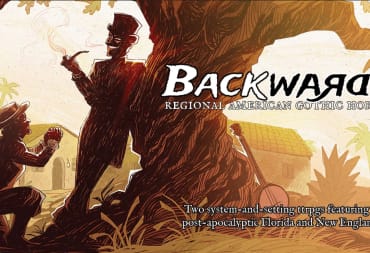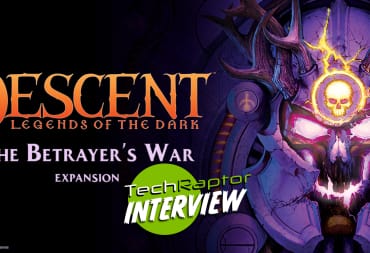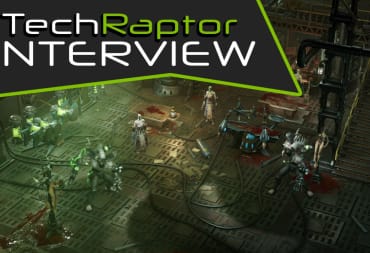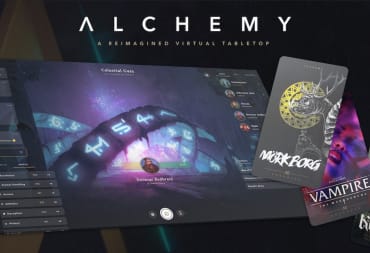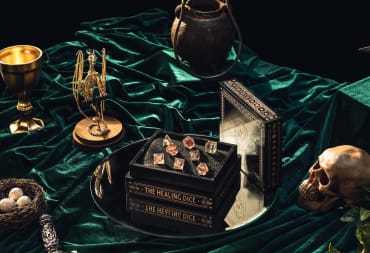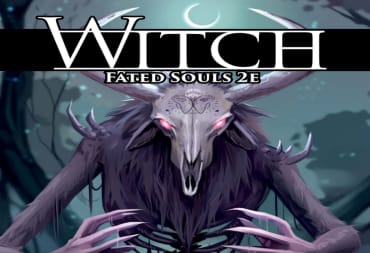I'll be the first to tell you that the world needs more tentacle-mouthed monstrosities with convoluted names, so you can imagine my delight when I heard that Evil Hat Productions was working on Cthulhu-based sourcebook for Fate Core. Fate of Cthulhu will bring the Lovecraftian Mythos to Fate, with a nice dollop of Terminator on top too. With the game's Kickstarter on the horizon, I sat down with game designers Stephen Blackmoore and PK Sullivan to talk about the project, what we can expect, and how to punch Cthulhu.
TechRaptor: So since the Kickstarter is just coming up and a lot of people might be reading about this for the first time, what is Fate of Cthulhu? What would be the elevator pitch for this book?
Stephen: Cthulhu as Skynet. That's how how Fred [Hicks] and Chris [Hanrahan] put it: basically Lovecraftian Terminator.
TechRaptor: That sounds delightfully sinister.
Stephen: And it was fun to do. We kind of took that and just ran with it.
PK: Yeah, so it's combining the world ending apocalyptic horror of Cthulhu and the whole Lovecraftian Mythos with the time travel shenanigans and unpredictability of the changes to the time stream from Terminator. So where Terminator is sending back a robot wrapped up in a flesh suit that is Arnold Schwarzenegger, in Fate of Cthulhu the things that get sent back in time after you are horrible squamous things wrapped up in a flesh suit to look like people.
Stephen: Or Arnold Schwarzenegger [laughs], which is not the same thing.

PK: Yeah [laughs]. But from a game perspective, the idea of what we’re doing is very much in the vein of Terminator 2 more than Terminator 1 because the concept of the game is at least one of the player characters is going back in time to change the future, because the Old Ones arose, they completely destroyed the Earth or just made things horrible, and the surviving resistance has managed to find a way to send a person back in time with knowledge of the future so that they can try to change it and prevent that future from coming up. What we’ve done from a gameplay perspective is we've developed a system where you actually change the timeline over the course of play. So at the start of the campaign you have a timeline that everybody knows about because someone's from the future, this is their history.
Stephen: Which in and of itself can be a narrative problem for the players, and we’ll get into that in a second.
PK: Right. As you play through the major events of this timeline the other events that you haven’t played start to change, and only the GM sees that. The GM is the one that goes through and does that process. So as they go back in time—again, looking at Terminator to Terminator 2—that future has changed. But Sarah Connor doesn't know how it's changed until Arnold 2, the T-1000, comes back in time and tries killing everybody.
TechRaptor: So is the timeline set by the GM or is that something in the book?
PK: We have 5 timelines in the book but we also have rules for creating your own.
TechRaptor: Okay.
Stephen: Yeah, we basically put together a framework and PK did an excellent job of figuring all that out and how we could build up those things. And we did a lot of back-and-forth on what would and wouldn't work and what fit and what didn't, and I wrote up the scenarios based on that and those actually came out of one major timeline that we were just playing with initially, and then realized that wasn't going to work, so then we tried coming up with multiples that didn't quite work, and then we came up with this one. This was actually Lenny Balsera, i think. He’s the one who basically changed it around for us and said "I like this idea, what do you guys think?" And “Oh hey! Let’s do it that way!”
PK: Yeah, it was from Lenny's feedback that I sort of pivoted and said “Well what if we have mini campaigns?” What if in the timeline we have these four major events and each one of those is an adventure. So then your five-event timeline is a small campaign that you can play through, but since you changed the timeline, if you wanted you could go back and start over using the timeline that you changed as the new starting point.
TechRaptor: Sure, and I bet it's a lot easier to organize it that way too, from a GM's perspective, if it's divided into some neat little parts.
Stephen: Yeah, and the way I wrote up the scenarios is the idea that you go back in time now and you have history, but history isn't necessarily correct. So we've got them split into "this is what the players know" and then specifically for the GM these are the "things they don't know". And looking through the lens of history, it can be a can be incredibly wrong or it be right-on. And so for each one of those timelines, we grabbed one of the Cthulhu Mythos baddies and that was the one that was going to rise up; [so] those four scenarios, how those played out, some other factors mechanics-wise, and how you change timeline would actually affect that outcome. PK, I know you can answer this, but I'm not sure if you can actually get a good enough result all the way through so that the Old Ones never actually show up.
PK: You can. That's if you end up with all four of them having been flipped to positive and staying there. That's pretty much as good as it can get: even though the rest of history might be terrible, the doomsday never arrives.
Stephen: Or that doomsday never arises necessarily. There might be another one.
PK: Right, the best case scenario is everything that the player characters have done means that on the scheduled judgement day nothing out of the ordinary happens and they don't see the rise of the Elder Gods, and eventually they might decide that it never happened or it's not going to happen. Whether or not that’s true is up to the players at the table and how dark of an ellipsis they want at the end of their campaign, but it’s never explicitly “Yay! You’ve successfully driven the Elder Gods back into their own terrible dimension and they will never be seen again!"
Stephen: Yeah, we had a lot of fun playing around with that and trying to build in horrible choices to choose from for the players to figure out how they wanted to do something. You know, one of those “Well this will kill 5 billion people. This will kill 8 billion people. But if we kill the 5 we at least save 3? Maybe?” That kind of thing. And you're not going to know about it until you run into it.
TechRaptor: Yeah it's some of the funnest parts of role playing games isn’t it? Making people choose between terrible things [laughs].
Stephen: Yes. And in these, everything is terrible. There is nothing good in any of these [laughs].
PK: One of our big goals was to avoid the shiny happy unicorn possibility. There should never be an outcome in this game where the future is just bright shining roses and everybody has unicorns and nothing is ever bad. That is not Cthulhu and we don't want that to be the way it is. I originally had designed the game so that after you completed one of the events you would actually roll randomly to determine how that affected the future because I wanted to have the events of your actions in the present have unpredictable non-deterministic effects on the future. And people didn’t like rolling to change the timeline because it felt too random and too arbitrary and too much like a board game, which is why we moved more into the system where the players and the GM are sort of competing to fill up good and bad marks on the timeline track, and that way if they fill up that track then they get to change something in the future positively or negatively. So those build up over the course of adventures and you are seeing the changes happen to the future that way, but that also let us put things into the GM's hand so that the GM would be the one changing the future and now the information the players had at the start of the game is even more imperfect than the natural course of course of history. Now they have changed the future and what's going to happen isn't necessarily something they can predict, because things are different.
TechRaptor: Sure, the longer things go on the less they can rely on that one character’s knowledge
PK: Yup. And we do our best to avoid the super heavy weight of that by keeping the campaign short. So as you progress you'll eventually have a weight of changes that have been made to the timeline, but since the campaign is really only about four adventures long and the adventures can be as long or short as you want them to be, there will only be four major instances of changing the timeline. That really helps reduce the load of a constantly in-flux timeline. It should at least still somewhat resemble what happened originally, but details will be different.
Stephen: Yeah, like we've got one where one villain—a human—shows up in most of the scenarios. Well there’s always the possibility they kill him early on, so obviously he's not going to be there for the rest of it. So it ends up being “Okay, well then then somebody else is taking his place." That detail may be different, but the basics of that particular scenario are going stay the same. So your information won't be so imperfect—usually [laughs]—that it becomes completely invalidated. It just doesn't necessarily go anywhere near where you expect it to and change the timeline. Even if you’re changing the future for the better you could be making other events and other scenarios worse depending on what the GM takes away from it and what the players come together with in the direction they want to take things. So it puts a lot of power into the GM's hands but it also gives a lot of the collaborative storytelling to the whole group. That’s Fate, that’s really what that’s about is telling awesome stories with each other.
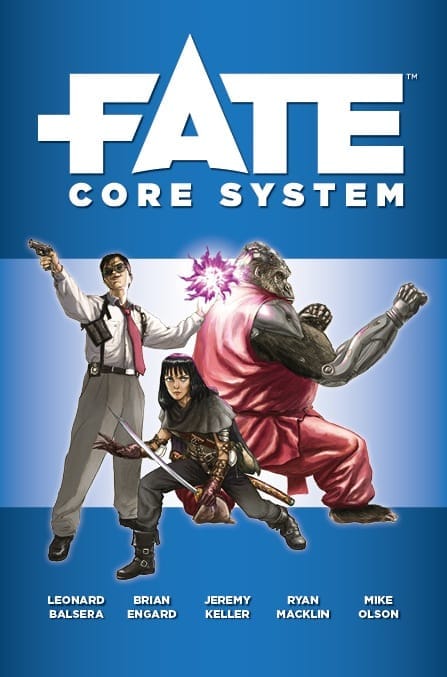
TechRaptor: Yeah, nice. So the role-playing game space is pretty bloated with these medieval and Western fantasy stories and settings, so what drew you guys more to this eldritch horror Lovecraftian time-warping setting?
Stephen: Fred [laughs].
PK: Yeah, Stephen and I were brought in to develop the game and the setting, so we are hired guns on this one. So that’s actually a question we can't answer because we were given the marching orders to mash together Cthulhu and Terminator and it's been a great project, but we don't know where Fred and Chris came up with it.
Stephen: Yeah, and when we say marching orders it’s a very broad suggestion. When I say Cthulhu as Skynet, that is literally all they told me.
PK: Yeah that was pretty much the pitch.
Stephen: And then I was like “Okay, let me see what I can do with this,” and from PK’s ideas with affecting time travel and the timelines that I had put together we were able to match them up and get it all synced up and I think we did a pretty good job.
PK: I think so. And we also had a lot of help. Ed [Turner], our project manager, Sophie [Lagacé] .
Stephen: Lenny, Sophie.
PK: Ed Turner, Lenny. Sean [Nittner] was involved pretty heavily early on.
Stephen: Sean actually sparked one thing that I wish we had actually put into the time travel section. PK, I don't know if you remember this one: multiple Sophie's.
PK: Yes.
Stephen: Yeah, so the premise for the time travel is you can only go backward. Going forward splits you into all the different possible permutations of the futures and then tries to stitch you back together at the end of it. So you don't come out human at the other end [laughs].
PK: Or even necessarily solid.
Stephen: Or necessarily solid [laughs]. So the idea is that you go back in time and in terms of the game it's at most 30 years. So you can set the apocalypse further out a little bit or pull it in or however you want to do that, but you've got a limitation on how far you can take people back. But there's nothing saying that you can't keep going back if, for whatever reason, you know how. The technology for it is that someone has figured out how to connect with the Elder God Yog-Sothoth and tap into its dimensional abilities, and that's what allows time travel to go. The problem is—and this is something that came up with pretty much at the beginning and kind of refined it all the way through—is this idea of corruption. We didn't want to go with sanity like a lot of Lovecraftian stuff [relies] on where eventually you go insane. We wanted to stay away from that, so the idea is that as you encounter these things more and more, as you deal with them, or in some cases integrate them into yourself, you become more and more corrupted. Eventually your aspects change, eventually you can become one of the abominations you're trying to fight. So going back in time makes you more corrupt. It screws with the DNA. And we’ve got a track of corruption that can just steadily grow depending on the things that you do. And they'll give you powers, but at the same time they’ll make you less human. We were talking about this, we were fiddling with this idea and tried a little mini game.
PK: It was a pretty free-form RPG session over a hang out.
Stephen: That’s one way to put it [laughs]. And the idea was that Sophie's character was going to go back in time, but she was only going to go back a matter of a few days. And then we kind of played around with that so if she does go back in time a few days that means there’s two Sophies. And I put in this idea that you can change the future but you will not change your past. Your subjective timeline reality—what you remember—is intact. You won't suddenly turn into a different person, you just will not have the future go the way that you thought, and in some cases this means that maybe you’ll be born earlier or maybe you won't be born at all or whatever, but that doesn't change the character. So we have this idea where we've got two Sophies and we kind of extrapolated from there. What if they went “Oh wait a minute, we can’t solve this problem, we have to go back further to solve this problem.”? Well they go back a few more days and now there’s three Sophies. And then they go “Wait a minute we’ve got to go even further back,” and they keep going and keep going and eventually there'd be like eight or ten Sophies that could all be in the game that are all the same person from slightly altered timelines, but each one is getting progressively more corrupt, so at some point the first one is going to turn into an abomination and try to kill everything. And just this image of thousands of Sophies running around because of time travel just...I wish that I stuck that one in the book somewhere because yeah, that was fun [laughs].
TechRaptor: Yeah one of my questions was going to be how you could possibly balance your game when you introduced time travel mechanics. Time travel in just about every movie, game, or TV show opens up such a can of worms, but that corruption mechanic really helps put a cap on it, doesn’t it?
Stephen: Yeah.
PK: It really does. The thing with corruption, like Stephen said, we really wanted to avoid the problematic trope of sanity in Lovecraftian games, so we hit on pretty early that dealing with the Great Old Ones, using that technology, having it implanted, makes you more like them. And eventually so much of you is lost and has become part of the Old Ones that you are just lost as a human being and are no longer a viable character. So that's the way we ran pretty early and we needed a way to track that, so I came up with the idea of when you become corrupt, one of your aspects changes. So you are no longer great at making first impressions, you now have a shoggoth’s left arm and that becomes your aspect on the character sheet and that is changing your character on a fundamental level. And generally speaking having a shoggoth’s left arm isn't going to be great for you in most day-to-day scenarios.
TechRaptor: It does sound kind of cool. [laughs]
PK: It does, you may be able punch things really hard.
Stephen: There's a lot of really cool ideas on that that we've got in there, but exactly what PK's saying: in one specific scenario you can do this awesome thing but every other type of scenario you're probably going to scare the hell out of everybody around you and they’re going to run away screaming.
PK: Yup. So [it is] pairing that more blatantly negative aspect which is more ripe for compels from the GM with something that gives you great power. The cost is that corrupted aspect, but the benefit is you get a corruption stunt. This doesn't cost any refresh off of your character sheet. The only way you get it is by having a corrupted aspect, but it is a stunt that gives you a greater-than-normal amount of power for a stunt. So if it’s a stunt that gives a bonus to a skill, it gives a +4, which is a huge swing in a Fate game. Or it’s a stunt that lets you just do something impossible that other people can't. But using that stunt comes at the cost of using the power of the Great Old Ones and corrupting yourself further. So every time you use that stunt you are marking a box on your corruption track. As you lean into it and use your power, yes, you're being more effective but you're also damning yourself as you go forward.
TechRaptor: Yeah, that’s pretty cool from a role-playing perspective too because now the player just constantly has that moral dilemma almost every time. It's almost every decision that they make, that's an option now.
Stephen: And there are situations where throughout the course of the game you can become corrupted just by being there depending on things that happens, things you run into. There's an idea for magic which is the Old Ones' technology—the label of magic kind of stuck—but it's all mathematics that nobody really understands well enough to use it safely. And so there are situations throughout the game where you may have the choice of doing something or not doing something or gaining corruption, and it really increases the likelihood that you're going to run into this problem.
PK: Yeah, and I leaned into Powered by the Apocalypse design a little bit for some of this in that the GM is given new things that they can do as the cost of failure or while working with the various Old Ones as sort of an antagonist accrual. So one of the costs of failure specifically for using Old One tech or perhaps even just fighting against a horrible creature is “check a box on your corruption track”. So the GM now has that as a tool to push forward and move the characters closer to that doomsday clock.
TechRaptor: Sure. So you mentioned that there's a few different Great Old Ones as the big bad antagonists of the campaigns. Could you talk a little bit more about them and what sets them apart from each other and how they affect the campaign differently.
Stephen: Yeah. The ones we used, obviously Cthulhu. That was like “Okay we have to have this one”. Nyarlathotep, the King in Yellow, Shub-Niggurath, [and Dagon]. In terms of the differences of them, we assigned motivations and what they're doing, why they're doing it. The idea of “Oooooh this is evil for evil's sake”, that makes no sense to me, so we tried to go “okay well this may be an alien being that we don't really understand but at the same time they’re doing whatever they're doing for a reason”, so we needed to combine that with what makes them specifically different, with different powers, and different abilities. We've got one that doesn’t exist in linear time the same way everybody else does and that causes some things for the characters in the campaign that can be either good or bad. There's another one that exists at all the times, or rather remembers everything. So it knows what player characters are going to do, but only in terms of probability. It can't say "Oh yeah, this is what's happening," and then try to change everything; it’s like “Well you guys are doing this, so in a week from now I think this is going to happen,” and then narrows it down and narrows it down as you get closer to that. We tried to make them unique that way and also the scenarios themselves and the events and all that. I tried to make sure that they were as different from each other as possible and not just in a matter of “Okay, well Cthuluhu does this and Nyarlathotep does this,” but also the world you're starting from is different. We've got one where the the Earth was ravaged by a plague before the Old Ones came and that just made everything worse. We've got another one where Antarctica explodes. The whole thing. All the volcanoes go up. Things like that. We just really made sure that we kept them as unique as possible. Ed actually [also] contributed. I did a couple of the events and I just couldn’t get to it on time and Ed picked it up and I got to say, he's just fantastic. He just picked it up and ran with it, it was great.
PK: Yeah, Ed’s been great. I’m not the greatest with the Lovecraftian things. I really dug into the system and had a good time with that, but doing the Lovecraftian stories was not my bailiwick, so you and Ed really carried the torch there. It was a very awesome collaboration all the way through and as far as making the Great Old Ones different in play, again, I leaned a little into [Powered by the Apocalypse] design with the idea of fronts, except here each Old One has an agenda and it gives them a number of different elements for the GM to lean on, including their goals, like ultimately what is their world-conquering goal; their drive, what they want to get out of the world; their minions; their tactics, which are basically thematic responses of that Great Old One. Because Cthulhu isn't going to respond to a threat the same way that Dagon does or the King in Yellow [does]. Cthulhu is all about madness and dreams and corruption, so the tools that Cthulhu has at their disposal are very different from the King in Yellow's. The King in Yellow responds to a threat by birthing new copies of the plague and starting new cults and things like that, whereas Cthulhu is much more likely to figure out who is the threat and then corrupt someone close to them.
TechRaptor: Yeah tactics is a good one. It's always so helpful as a GM to have a very simple [layout of] motivations, tactics, here's how it gets stuff done, and it makes running it so much easier and smoother.
PK: Well, we have not statted up any of the Great Old Ones [laughs], so you're not likely to see them in the game. What GMs do with their own time is up to them, but generally speaking this is not a game where you show up and shoot Cthulhu in the face.
Stephen: Although you can.
PK: You could, it would just require some thought on the GM's part to design that and put it in. The Old Ones don't have a stat block in the traditional sense of an RPG, they're much more shadowy behind-the-scenes figures and you really are just working against their plots and machinations rather than having a stand-up fight against them.
TechRaptor: That's really cool. You guys are so good at answering my questions before I even ask them [laughs]. I even asked around with some of my co-workers to see if they had any questions and one of them asked "Can I punch Cthulhu?", which you just answered.
Stephen: I don't know, PK, if [Fred] told you the same thing, that's literally one of the things he said: “I would love to be able to get to a point where I can punch Cthulhu.” And we didn't go quite that route but we do have a couple of the campaigns where you do encounter the Great Old One during the campaign.
PK: Yeah the King in Yellow specifically, I remember.
Stephen: Yeah, it doesn't necessarily mean that you'll get an opportunity to punch them, but we did give them lots of minions to be able to do that to.
TechRaptor: I'll put that on my notes. “Can punch Cthulhu minions. Also no unicorns.”
Stephen: No unicorns.
PK: [laughs] No unicorns. So the way the timeline is constructed, each timeline is five events. And we use the word “event” because human language can’t really convey the full meaning of the wibbly-wobbly interconnected nature of time. It’s also a convenient narrative construct so the GM can run any of the events at any point in time, not necessarily linearly. Each one is five events long. The first four are all things leading up to the rise of the Great Old One, and then the last event is always Rise of the Great Old One—that's what you're working to try and stop. So the four are played pretty normally as you would any standard RPG campaign. Rise of the Great Old One is much more of a denouement. If you've ever played Fiasco, it’s you describing what happens to your characters at the end of the game following the events that you spent the whole day playing and building up to. In Fate of Cthulhu, you tell the story of that event based on how that event is looking at the end of the campaign and what tragedies and triumphs you want to have your characters experience based off of that rating. So yeah, if you get an awesome +4 rating at the end, if you want to punch Cthulhu in the face, you can narrate that happening.
TechRaptor: They probably earned it at that point.
PK: Yup. I'm not going to lie, I would not be mad if someone got a +4 run and was like "I’m punching Cthulhu in the face right back to R'lyeh."
Stephen: We're going to get a bunch of people who are going to write in after the thing comes out and go “Yeah we did that. Our game, we did that. We punched Cthulhu.”
PK: Who doesn’t want to? That’s half the fun of playing Arkham Horror.
TechRaptor: Alright, definitely-maybe punching Cthulhu. That's going in the notes. I guess that's all the questions that I have for you guys. Thank you for taking the time to talk about this, this was a very enlightening.
Stephen: I hope it made sense [laughs].
PK: It's a big complicated Fate game, so hopefully people will get what we're doing with it and it gives people many many hours of enjoyment. I think we did a really good job of not just creating a playable version of time travel but also coming up with useful tools for organizing campaigns for GMs who are playing any sort of game.
Stephen: Yeah the framework that we’ve got for the timeline, you can apply it to all sorts of things. We were actually having a conversation with Fred about that. Yeah, you can have Cthulhu be this horrifying event that happens at the end, but what if it's a scenario like 12 Monkeys or a scenario where maybe it's a zombie plague. Who knows? But all of those in regards to a time travel mechanic, you can fit it into this.
TechRaptor: Yeah not a lot of games do time travel so completely and so ingrained in the mechanics.
Stephen: I know for myself when I was doing the narrative piece on it I tried to keep it is as expansive as possible—just lock in a few rules that kind of guide the things you can and can't do for for it without painting anybody into a corner, because I've done that in books where I'd get two-thirds of the way through the book and go “Oh s***, I just screwed myself because I set this thing up in this previous book and now I have to live with it.” I didn't want to do that, and we also wanted to make this our own, so the Great Old Ones may not be what a lot of people are expecting, or what they are or what we do with them. This is our take on Lovecraft, and I think the time travel and all of it works because we've got a good framework but we don't have a lot of things to say “thou shalt”, but [instead] ways for things to be structured to make it work and not tie the hands of the GM or the players.
TechRaptor: Yeah it sounds like you guys did a real good job. I'm definitely interested and looking forward to it.
PK: Yay!
Stephen: I hope we did a good a job. [laughs]
PK: I think so. It's been it's been a long road. I’m really happy with the work we've done, but also happy that we finally have it done. [laughs]
Stephen: [laughs] I’m good with being done with that. I was looking at my emails on some of this and I think we got started in like mid-late 2016.
PK: 2015.
Stephen: 2015. It doesn't feel like it was that long and at the same time it does.
PK: Yeah, I mean in that time we've gone through so many major life changes and personal tragedies. I lost a grandparent, Sophie had cancer, these things all happened in the course of time that we were writing this project, and we kept through it and here we are.
TechRaptor: It really makes it feel like it's your baby, doesn't it?
PK: A little bit.
Stephen: Our squamous wobbly disgusting baby [laughs].
PK: [laughs] Sounds like we did a good job.
TechRaptor: And people will be able to Kickstart your squirmy wobbly baby in a few weeks I guess.
Stephen: Yeah, I think that it's going to be fun.
The Kickstarter for Fate of Cthulhu is expected to launch near the end of April. You can stay up to date about the game over on Evil Hat's website.
Have a tip, or want to point out something we missed? Leave a Comment or e-mail us at tips@techraptor.net








